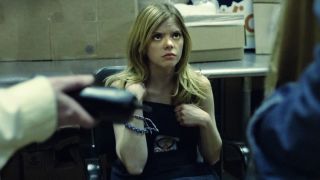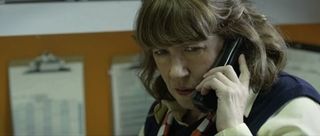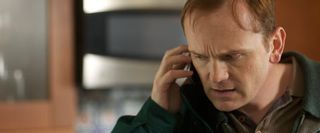Compliance Director Craig Zobel: Why The Controversial Film Was More Than He Knew Was Walking Into

If you've heard of the indie film Compliance, odds are you've heard it described as controversial. When it debuted at the Sundance Film Festival in January it was met with engaged and sometimes hostile audiences, who took objection to the film's depiction of a bizarre but very true story, in which a prank caller convinced the manager of a fast food restaurant to detain, harass and eventually abet in the rape of one of her employees. Director Craig Zobel, who previously made the well-wrought indie comedy Great World of Sound, spoke of the collaborative nature of the fllm's set and how much he developed the story with his lead actresses, but of course, a story about teamwork and a careful handling of a controversial story doesn't travel nearly as fast as that of hostility at a Q&A.
Luckily for everyone, Compliance had a long journey through other festivals before coming to theaters in August, and Zobel told me that most of the Q&As have prompted the kind of conversation he wanted to start when he made the film, which forces a lot of questions about how easily we blindly obey anyone who presents themselves as an authority. But Zobel's career also brings up a lot of questions about the current state of indie filmmaking, how a director who made one tiny movie five years ago can return with another tiny movie, but a long string of projects that never quite got off the ground-- including one for 20th Century Fox-- and how you establish yourself as independent filmmaker without putting yourself in a single box.
Zobel and I talked for a long time at a cafe in lower Manhattan, so here are excerpts from our conversation. Compliance is in theaters now; you can see a list of where it's currently playing and where it will be in the future here.
It's been 5 years since Great World of Sound. I'm kind of fuzzy on what you were doing in the intervening years.
Me too, man.
That movie did pretty well.
It did pretty well. I had a movie that was really ready to go, and it fell apart during the Writer's Guild/SAG strike. And then all of a sudden there was a big economic downturn. Then after that there had already been 2 more years of cool Sundance people.
CINEMABLEND NEWSLETTER
Your Daily Blend of Entertainment News
So you weren't the hot new thing anymore?
Right. But I wrote for other people, that's how I paid the bills. I wrote a thing for Jim Henson with one of the Homestar Runner guys, that was really fun. Rewrote two other scripts. I was trying to get that movie made, and eventually I found this other project called Gizmondo.
And that's what you're doing next, right?
There might be one in the middle that just popped up, that's really cool. [This project turned out to be Z is for Zachariah with Tobey Maguire]
Having survived having all these projects fall apart, but now having successfully made Compliance, are you feeling differently about indie production?
I was trying got make these other films, and I was frustrated because I was just trying to make a movie. I had been playing around with this idea, and I proposed it to David Green, my buddy, saying what do you think about this? And he was like "You should totally make that movie, that's crazy." That was Compliance. If I was going to do the same thing on a not too much bigger budget level, I should be making something that was challenging me.
Does it also seem like you need to expand the kinds of movies you're known for making?
It was weird, because I totally didn't make this movie for career strategy reasons. I really didn't. I know that sounds maybe bullshitty. But I was like, well, I'm really scared of doing a movie like this, and it will bomb and fail in 4 or 5 ways I can think of off the top of my head, or it won't. And I was like, I should be doing that because you should be pushing yourself and making cool stuff. Being scared of a project is the reason to do it.

You made the movie because you wanted to start a conversation, but then it resulted in these kind of hostile Q&As at Sundance. You've been taking it to other festivals since then-- has it been more of a conversation since then?
Absolutely. I would be lying if i said that there aren't some people that have a negative reaction to the film. The decisions we were making, we kind of knew that some people were not going to be into that kind of movie. It's been totally different. I think there's some acknowledgement that "I feel disturbed by your movie, but I think it's really fascinating, can we talk more about it." Then there are a lot of people who want to put it context of the true stories, understand that kind of thing. It's really interesting to me, the few times I've had experiences where people, either by Facebook or that, have reached out days after and said "I'm still thinking about your movie." It's cool that it's resonated enough that they've bothered to try and find me.
It puts the spotlight on you in a way that not a lot of movies do. You think about the director more than in most movies.
Like, intent. More than I knew I was walking into.
Were you thinking a lot about your own intent while making this?
I felt like I was first explaining to the people making the movie with me what I thought was interesting, and why this was worthwhile, and coming to consensus with the people who made the film with me. So it sort of felt like I had done it.
It makes me think of Vertigo, where people look at that movie as a metaphor about Hitchcock and the way he treated his actresses in his movies. When you're casting someone to play the part that Dreama plays, does that level of control occur to you? Are you consciously trying to work around that?
I've heard this before, "As the director aren't you doing the same thing…" But I don't get it. Don't you know how they make movies? Dream read the entire screenplay, wanted to come in for it-- which a lot of people didn't-- was curious about the movie… That's not how movies get made. I don't get the question, really. Do you think I made her go stand in the corner between takes and was mean to her?
But there is the way that you're the one behind the camera, telling people where to stand, which lines to say.
There's a screenplay, and she read it and knew what it was. And actively between takes would come look. Like anything that had to do with nudity, I would show her every take of it. It's not what the experience that you just described is. I guess in the most basic way I'm like "Go stand over here," but it just doesn't feel like the way that i experience every movie I've been on, that that's the relationship between a director and actor.
But you think about Lars von Trier, and the way he treats his actors…
Your'e right, that is a way to do it. It doesn't even occur to me… sure, I could have been a total jerk. "Do what you're told! Your job is to stand over there!"
It's not so much being a jerk, it's that as the director you're shaping this world and it's a level of control that most people don't have over stories. That parallel is there for people to make, and not about what you did.
But I still don't understand it. What is the critique? Now that you talk about it, there's that whole documentary with Stanley Kubrick yelling at Shelley Duvall. That makes me cringe slightly.
Even not even that you were bad to everybody, just thinking about being on the set makes people uncomfortable. It sounds like that doesn't work that way for you.
This is what's funny about this question. I do know that there are people that manipulate-- certainly it's happened that people have manipulated these situations before, obviously we know the stories. I guess, I don't know, I was really thinking about it, all the time. I was trying to be safe and make those decisions in a way that wasn't like that. I guess I can see it in the abstract of not fully knowing director-actor relationship, or how that normally works. There's less bossing around than you would think. It's more of an agreement that we've all come to, at least for me.
You know what's cool about this movie? We could talk about this even more for another 20 minutes. There's probably a million more things to say. And this is just one kind of conversation to have about this movie. Which is a valuable thing, in having made this movie. There's a lot to talk about.

Are you learning new things about it through these conversations?
Absolutely. I feel like I've learned something every day. Sometimes when people are looking at something with a critical eye toward me, and sometimes they're in complete agreement with something like "I've never thought of it that way."
More so than on Great World of Sound?
Definitely. I've had really interesting conversations with actresses about nudity, I've had sort of all these different so many different, interesting conversations, and been privy to other people having conversations about, say, different waves of feminism, things that I'm undereducated on, but totally interested in. Second-wave feminists actually don't like this movie, and third wave, or more contemporary people who feel like they're activists in the movement, respond a different way. This is a thing I was talking about with my girlfriend last night, certain people expect a movie to show them the way we hope the world will be, and they get frustrated, like "I don't want to see that stuff."
When people make movies set in the middle of the country, a lot of people get their hackles up. You're from the South-- you must get that as much as anybody.
Like white trash fetishism or something like that.
Yeah. And people probably accuse you of that, like "he thinks people in the middle of the country are stupid."
I know. That's my least favorite. That's the one thing that I'll push back on. I've even had friends, or people that have seen the movie, who have said something to the effect of "In the first few minutes of the movie I was worried it would be the smart intellectuals making fun of the dumb hicks, but it's not that." That's one of those things where like-- I think the root causes of the story in this movie happen could totally happen here, like where we are right now.
You and David Gordon green and Jeff Nichols, you've all made these movies in the South, and coming from this world. You obviously don't want to be like "I am defending the working class!" but do you feel that ownership over your roots, like you need to make movies that aren't just set on the coast like so many other indies? Just personally?
I can speak to anybody else-- though I think they would probably all stumble into similar answers to what I'm going to give. This is what's interesting to us. I don't know if it's necessarily, "Oh, I couldn't make that movie that takes place in New York." I could do that.
You have a voice that comes from somewhere different, so why not use it.
It's less of a conscious thing, but it feels more real. That's the people that I actually know in the world.
Staff Writer at CinemaBlend
Most Popular





